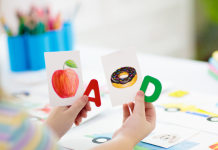Kindergarten screenings are coming up at the local elementary schools. All the moms from my parent groups are having these crazed conversations – what is a kindergarten screening like? Are they ready? Am I ready? Can we prepare them any more? What do we work on this summer?
I help to run the Kindergarten screenings at the school where I work. But I’m also a parent nervous about my own child’s school readiness.
I am a pediatric occupational therapist, and I do this for a living. As part of my work, I help screen community children for school readiness. I work with some to catch up to their peers, and assist others with disabilities to participate more effectively in school.
At the school where I work, our screenings are formal. Parents meet with an administrator and a counselor, children have short screenings with me, the speech therapist, special and regular education teachers on the kindergarten team. They have their hearing and vision checked by the school nurse. After the screening day, our team sits together to compile information, generate reports to send home, and determine class placement for the fall. My mom friends have shared less-formal experiences where everyone got a tour of the school, the kids played in the classroom and colored a picture while parents had a Q&A with the principal. My friends in NY get to take a school bus ride – truly a highlight for many kiddos!
Today, after screenings locally, my child reports that he read a book, played alphabet soup, counted and cut shapes. The parents went on a tour with the principal, submitted required forms to the school office and nurse, and were given paperwork about the fall. He came home with a book about going to kindergarten, and some play doh. There were no reports, it was pretty easy – I think it went well, but who knows?
Does this mean he is REALLY ready? What are they assessing?
In OT based screenings, I am looking at recognition of simple shapes, and skills to copy them. I assess balance and motor coordination to hop, gallop and skip, as well as throw and catch a ball. I evaluate fine motor skills such as manipulating paper, cutting and writing their first name. Not that I do NOT want to know if they can write upper and lowercase letters of the alphabet as that is not developmentally appropriate for most kids this age.
Many professionals in the field are beginning to focus on readiness indicators that are less academic. In addition to meeting the age cutoff (in NH it is October 1st), they look at soft skills such as attention, social development, and emotional regulation. Teachers also note creativity, risk taking, working as part of a group, and connecting with peers and adults. Children are expected to manage their own dressing/toileting needs.
So, what can you do this summer to “be ready”?
- Make sure your child knows their safety information – name, date of birth, address, parents names, etc.
- Spend time outside – ride bikes, swim, make sandcastles, chase waves, climb trees.
- Organize a large group game with the neighborhood kids: play ball and draw with sidewalk chalk.
- Talk about school, connect with other children who might be in the same class
- Visit the playground so they have some familiarity with the building.
- Focus on sensory development, here are some other summer fun ideas!
So much growth happens naturally in the summer, especially outside. With outdoor play (particularly with other children), your child will have the chance to grow and develop their social/emotional, motor, and physical skills.
If you’re looking for additional information about kindergarten readiness, here are a few other good resources to check out: Mayo Clinic and Huffington Post.










